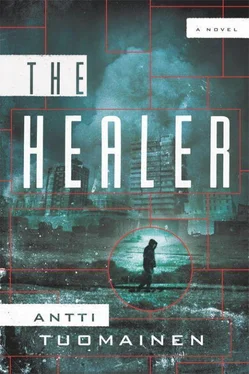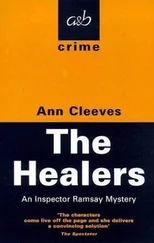In spite of the shock and feeling so sick, I fell asleep in the backseat of the taxi. Dreams came in swift waves, like seizures. In the clearest of the dreams, Johanna was whispering something into Laura Vuola’s ear, both of them looking at me, afraid and angry. Johanna held her hand in front of her face so that I couldn’t see her lips moving, but I could tell from the expression on Laura’s face and the direction of her gaze that they were talking about me. I felt a swift, altogether irrational sting of jealousy, then I woke up. I couldn’t get the dream out of my mind at first, and sat groggily wondering what they had been saying.
I finally came fully awake when Hamid slammed on the brakes and I was thrown against my seat belt. The strap locked up, and I felt a pain in my side. When the car had come to a complete stop I was able to get my breath and loosen the seat belt. We were behind a bus, with mere millimeters between our bumpers.
“Sorry,” Hamid said. “That was a rough stop.”
“It’s OK,” I said, looking around.
We were on our way to Munkkiniemi. At the moment, though, we were stopped at a busy intersection waiting for our turn to move into the passing lane.
The rain had let up, replaced by a fog that filled the space between the earth and sky and was so thick in places that the cars nearby disappeared, leaving nothing to show their existence but their white headlights and red and yellow taillights. When we started moving again, the whole world seemed to be made up of vague, fragmented bits like a poor-quality video broadcast—the car that was over there is now here, there was a house there but now it’s gone, a light is flashing beside us, and now it’s moved in front of us.
I looked at my phone and quickly went through the files I’d saved about Tarkiainen. I’d looked at them cursorily before. I hadn’t noticed that there weren’t four addresses for Tarkiainen, but five. I hadn’t noticed it because two of his former addresses were the same—he had lived in the same apartment in Munkkiniemi at two different times, first about twenty years ago, for two years, and then again in the year before his death.
Hamid found the house quickly, parked on the street, and listened with a friendly, patient look as I explained again that I would need him to stay here and not take another fare.
“I understand, I understand,” he said with a sigh, and I stopped explaining.
It made him smile.
I left his smile in the rearview mirror, got out of the car, and walked across the asphalt driveway to the door of the building. A soft, almost imperceptible breeze stirred the columns of mist like slow-motion cotton candy. As I walked I could see the fog open in front of me and close behind me.
It was a 1930s-era building, in good condition from the look of it—the beautiful wood grain running over the surface of the door was freshly lacquered. There was a brightly lit name directory on the wall to the left of the door, each name followed by a buzzer. None of them meant anything to me. I pushed a few buzzers at random: Saarinen, Bonsdorff, Niemelä, Kataja.
Bonsdorff answered.
I pulled the door open and looked behind me. The fog was so thick that if I hadn’t known Hamid’s taxi was parked on the street, I would have had to go look for it. According to the directory, Bonsdorff was on the fourth floor. I pushed the button for the elevator, rode it up, and twisted the old-fashioned metal bell on a door with a mail slot that read BONSDORFF.
The point of light in the door’s peephole darkened momentarily, then the door opened. Bonsdorff, it seemed, was Mrs. Bonsdorff, a woman at least eighty years old.
“I’ve been waiting for you,” she said.
I didn’t know what else to say but “I’m sorry you had to wait.”
“These days?” she said with a snort. “Come on in.”
She turned and walked into the apartment. I didn’t know who she’d been waiting for, but since she’d opened the door and told me to come in, I obeyed.
It was a large apartment, five rooms and a kitchen, from what I could tell at a glance. Mrs. Bonsdorff looked and sounded like she lived there alone. A glimpse into a couple of rooms confirmed the impression: they seemed to be unused, the requisite quilt at the foot of the bed and decorative pillows had been put where they were a long time ago. I followed her into the living-dining room and waited for her to stop and tell me who she’d been waiting for and perhaps let me tell her why I was there.
She walked across a black and burgundy Oriental rug the size of a squash court. It was so big I was sure someone must have got lost on it at some point. She went to the television and knocked her small fist against it a couple of times.
“Here it is,” she said. “No picture.”
I looked at the television and then at Mrs. Bonsdorff. She was a short woman with curly hair, dressed elegantly in a gray blazer even at home, radiating resolve and energy in spite of her age and stooped posture.
I thought for a moment.
What harm could it do?
I walked across the squash court to the television, checked to make sure the cords were attached, and tried to turn it on.
“It doesn’t work,” she informed me.
I looked at the cords again and noticed that one of them was hanging slack. I followed it under an antique bureau of dark wood and behind a rococo sofa, and found that it had come unplugged. I plugged it in and went back over to the television. The picture appeared immediately.
“I could have done that myself,” she said.
I switched it off again and turned to look at her.
“Shall we agree that I won’t take any payment if you answer a couple of questions?”
Something flashed in her eyes.
“I should have known,” she said. “What repairman comes on the same day you request him nowadays? Would you like some coffee?”
We drank coffee from porcelain cups at the dining room table. Mrs. Bonsdorff wore a gold and diamond ring on her left hand, touching it and turning it on her finger regularly, habitually, laying the diamond against her little finger and then straightening it again as she spoke. This made me aware of my own wedding ring, a thick band of white gold with a level edge. I’d put it on my finger ten years ago, threaded through with the woman I was searching for, a search that had brought me here.
The coffee was dark, strong, chocolatey. I realized I’d been craving a cup of coffee. I also realized that I couldn’t have drunk a thing one second earlier. I pushed the images from the apartment in Jätkäsaari out of my mind again.
I told her I was looking for a man who had once lived in her building, described Tarkiainen to her, told her his name and profession, and added that it was possible I was in the wrong building. Finally, I showed her the picture of him on my phone. She went stiff and assured me that I was in the right building.
“I remember him very well,” she said.
“He died five years ago,” I said.
She looked confused.
“Five years ago?”
I nodded.
She held on to the small porcelain handle of her cup as if she might pinch it off.
“At my age the years go by a bit faster, of course, but it couldn’t have been five years ago.”
“Why?” I asked.
“Because it was just before Erik died,” she said. “My husband. He died of liver cancer. It started as throat and stomach cancer. He was in terrible pain, pain beyond description.”
Her searching gaze drifted out the window into the fog.
“I loved Erik. We had nothing left but each other,” she said quietly, and took a sip of coffee. I took a cookie from the saucer on the table, bit off a small piece, and let the toffee flavor dissolve in my mouth. She set her cup in its saucer with a clink.
Читать дальше












